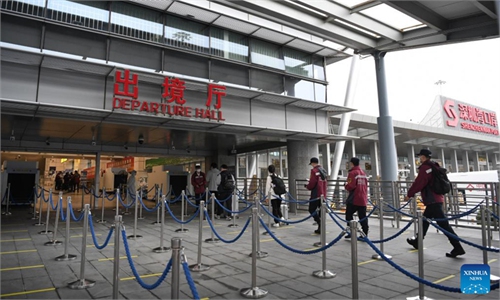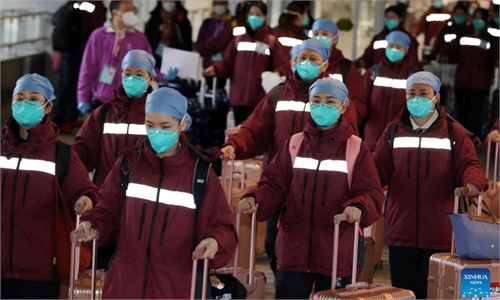
Construction crew work at the site of a temporary isolation facility to house COVID-19 coronavirus patients at Kai Tak in Hong Kong on February 20, 2022. Photo: AFP
From preventing cross-infection among medics, quickly reducing new infections and preventing mild cases from progressing into severe cases, the arrival of aid from the Chinese mainland to Hong Kong will bring a lot of Wuhan experience to fight against the new wave of COVID-19 epidemic to the city, experts noted. Hong Kong reported 6,067 confirmed cases on Sunday.
The aid team from the mainland that was put together so quickly has already made good progress, Xia Baolong, head of the Hong Kong and Macao Affairs Office of the State Council said at the fourth coordination meeting held in Shenzhen on Sunday.
Among the 114 team members who arrived on Saturday to Hong Kong in the second tranche of aid are four management personnel and four specializing in treating severe cases, and 106 testing personnel. Many come with experience of dealing with COVID-19 epidemic in Wuhan, the Chinese city hit the hardest in the early stages of the outbreak.
The epidemic in Hong Kong might be the most severe in China since the Wuhan outbreak two years ago, Jin Dongyan, a biomedical professor at the University of Hong Kong, told the Global Times.
Among the 6,067 confirmed cases on Sunday, 6,055 were locally transmissions, of which nearly 1,000 cases were detected from residential compounds.
The outbreaks in Wuhan and Hong Kong are different but the anti-epidemic experience accumulated in Wuhan is still of great value for Hong Kong, where the seriousness of the outbreak is approaching to that of Wuhan in the earlier period, Wang Guangfa, a respiratory expert at Peking University First Hospital, who was also among experts of the National Health Commission to visit Wuhan in early January 2020, told the Global Times on Sunday.
One of the most important references for Hong Kong is that none of the more than 40,000 medical staff who aided Wuhan contracted the virus. This capability will definitely raise the morale of medical staff working in Hong Kong and the confidence of residents and the Hong Kong government to beat the novel coronavirus, Wang said. Lack of confidence to win over the virus is one of the reasons why Hong Kong has such a record high number of COVID-19 cases, some said.
In addition, Hong Kong medics can draw on the clinical experience of the medical personnel who were dispatched to Hong Kong. Some of them not only experienced the Wuhan outbreak but accumulated a vast amount of experience in treating patients, ranging from mild cases to severe cases in many rounds of local outbreaks in other mainland cities. For example, they know how to treat patients to avoid mild cases progressing into a severe case to reduce the death rate, Wang noted.
Though many patients in Hong Kong have only mild symptoms, they are still contagious and could spread the virus to their family members and colleagues, so, screening out the sources of infection and cutting the chains of transmission is essential, which proved effective in Wuhan and in other mainland cities, a Wuhan-based medic told the Global Times on condition of anonymity. Quarantining patients who live with elderly people, even though they have mild symptoms, is particularly important, the Wuhan doctor said.
Data shows that before a patient with COVID-19 exhibits symptoms they are contagious and could spread the virus easily and quickly to people who are in close contact with them, experts said.
Another 14 deaths and dozens of severe cases were reported, Hong Kong health authorities said on Sunday.
Aid from the mainland naturally brings more Wuhan experience to Hong Kong. Building makeshift hospitals to expand Hong Kong's capability to quarantine and treat patients is exactly what Wuhan did in the early period of the outbreak to alleviate its overloaded medical system, which helps to place sources of infection within quarantine and cut off transmission chains, experts noted.
Designed and built by the China State Construction Engineering Corporation (CSCEC), two community isolation treatment facilities in Penny's Bay and Kai Tak Cruise Terminal began construction on Saturday. They are expected to provide about 9,500 quarantine units, the Global Times learnt from CSCEC.
Just like Wuhan which also received aid from across the country to eventually overcome COVID-19, Hong Kong is also receiving the best resources from the mainland. With the best resources and unity from the country, experts are positive that Hong Kong can overcome the epidemic.




